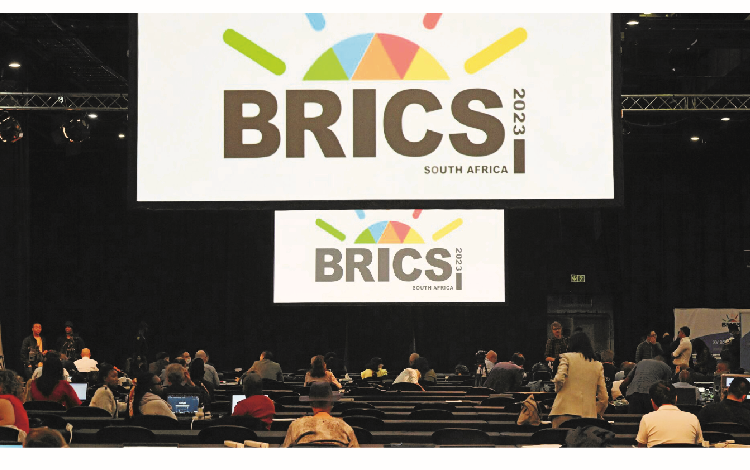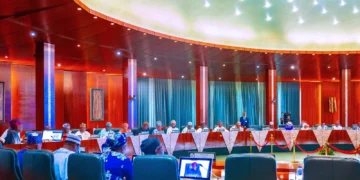The 2023 BRICS Summit held at the Sandton Convention Centre, South Africa, from 22-24 August 2023, has come and gone. It was the 15th edition of the annual international conference normally attended by the heads of state or heads of government of the six member countries – Brazil, Russia, India, China and South Africa. The Chairman of the 15th edition of the Conference and South Africa’s President Cyril Ramaphosa also invited the leaders of 67 countries to the summit of which several honoured the invitation. Nigeria sent its Vice President, Kashim Shettima.
BRIC is an acronym coined in 2001 by then Goldman Sachs chief economist Jim O’Neill in a research paper that underlined the growth potential of Brazil, Russia, India and China. The grouping began to evolve as an informal club in 2009 as an initiative of Russia. South Africa became the first beneficiary of the group’s expansion in 2010 when it was admitted into its fold, changing the acronym from BRIC to BRICS. South Africa is the smallest member of the group in terms of population and size of the economy. Together, the BRICS countries account for more than 40% of the world population and a quarter of the global economy. Besides the formal goal of economic cooperation, members also seem united by an unspoken desire to engineer a multipolar world in which the hegemony of the current Western and US-dominated system is whittled down considerably, if not overthrown.
One of the important outcomes of the 2023 BRICS Summit was the invitation of six nations (from over 40 countries said to have indicated interest) to join the group – Ethiopia, Egypt, Iran, Argentina, the United Arab Emirates and Saudi Arabia. The new members seem strategically selected – the admission of Ethiopia, one of the fastest growing economies in Africa and the permanent seat of the African Union, is symbolic. It is the same for Egypt, which connects Africa to the Arab world. Saudi Arabia joining BRICS would mean that the world’s largest crude oil exporter will find itself in the same economic bloc as the world’s biggest oil importer, China. Also both Russia and Saudi Arabia are members of OPEC+, a group of major oil producers. Similarly the invitation to Iran, home to around a quarter of the Middle East’s oil reserves and which shares the burden of Western sanction with Russia, seemed again to be carefully thought through not just in terms of oil politics but also for its influence in the Middle East. Iran’s President Ebrahim Raisi was said to have celebrated his country’s BRICS invitation with a swipe at Washington. He was quoted as saying that the BRICS’ expansion “shows that the unilateral approach is on the way to decay”.
The invitation to Argentina not only connects to the Latin American angle but also taps into the current sentiments in the country. With a triple–digit inflation, a steadily deteriorating value of the peso and an overwhelming burden of debt repayment on a $44bn loan agreement with the IMF, frustrations with the Western system and a yearning for an alternative path to development and international cooperation seem quite widespread in the country.
The UAE, another influential Middle East country, has been a friend of BRICS for quite some time. It joined the BRICS New Development Bank in October 2021, after it was established in 2015. The UAE which enthusiastically accepted the BRICS’ invitation, said it has consistently championed the value of multilateralism in supporting peace, security, and development globally.
Where is Nigeria in all these?
BRICS has come a long way since 2001 when it was first hyped. As many of the then BRIC economies began to face challenges and failed to live up to expectations, investor attention was shifted from ‘emerging markets’ to ‘frontier markets’, a classification made up of economies smaller than those of the BRICs. Following from that, in late 2013, Jim O’Neil, the same Goldman Sachs analyst who created the BRIC acronym, popularized another acronym, MINT, which was coined by the Boston-based asset management firm Fidelity. MINT is a neologism referring to the economies of Mexico, Indonesia, Nigeria and Turkey. What was instructive about the four countries listed in the MINT club was that they were all members of the Next Eleven (also known as the N-11). The N-11 were eleven countries – Bangladesh, Egypt, Indonesia, Iran, Mexico, Nigeria, Pakistan, Philippines, Turkey, South Korea, and Vietnam – identified by the same Jim O’Neill in a research paper on December 12 2005 as having a high potential of becoming, along with the BRICS, the world’s largest economies in the 21st century.
At the end of 2011, the top four countries in the N-11 – Mexico, Indonesia, South Korea and Turkey (also known as MIKT) made up 73 percent of all Next Eleven GDP. MINT simply meant that Nigeria was given South Korea’s spot in MIKT. To add to the wave of Nigeria-optimism at that time , Filipino billionaire, Enrique Razon, was quoted as declaring during the closing activities at the World Economic Forum in Davos, Switzerland in 2014, that Nigeria was the best place to invest in that year. Razon, who controlled a $4.7 billion fortune at that time, according to the Bloomberg Billionaires Index, reportedly signed a deal to develop and operate a port in Lagos by 2016 in which he was to invest $225 million.
Essentially from 2005 (the Obasanjo years) until Buhari took over in 2015, the international optimism that Nigeria would be a breakout economy persisted. But in just eight years of the Buhari government, the optimism about Nigeria evaporated and the country became infamous for being pronounced the poverty capital of the World. This is one of the prices any country has to pay for an inept and nepotistic leadership.
I have read some commentaries by some Nigerians that BRICS is a mere hot air and that the country shouldn’t bother about it. With all due respect, I believe arguments like this are made either out of sheer ignorance of the dynamics of international economic relations or a consolation for being left out. The fact is that being located within important groupings like BRICS, even before it has fully taken shape, is itself power. It has emerged that Nigeria did not even apply to be a member of BRICS – either because it felt South Africa is taking a spot that should rightly belong to it (entitlement mentality) or because it wrongly believes in its own exceptionalism.
As Nigeria is pushed further out of relevance in an emerging bloc that has been consolidating since 2009 (despite intermittent challenges), there are fears that the West, suspected to be nudging the ECOWAS into war with Niger ostensibly to restore constitutional order in that country, may deceitfully try to move closer to the country to use her to blunt the current hurrah the BRICS expansion is generating across Africa. But I feel such, if it happens, will make Nigeria more of a pariah among African and BRICS countries. I also believe that effective diplomacy should be able to make the country part of an evolving BRICS bloc without discarding old partnerships – as the UAE is apparently trying to do.
Given that the desire to be a counter weight to the current Western-dominated global system is a shared value among members of the BRICS, it should be expected that the issue of restructuring the United Nations’ Security Council will sooner than later come up again. Nigeria, South Africa, Egypt and Kenya had featured as possible African members in various permutations floated in the past on how the UNSC should be restructured to make it more inclusive. Africa, which has the largest members in the United Nations General Assembly, has always felt short-changed by the current structure of the UNSC where only five countries (USA, Britain, France, China and Russia) wield veto powers. Djibouti’s President Ismail Omar Guelleh, who chairs the Intergovernmental Authority on Development (IGAD), captured Africa’s expectations with the BRICS expansion when he reportedly told the BRICS-Africa dialogue meeting in Johannesburg that the “partnership between BRICS and Africa goes beyond convenience… It is a step that places Africa in its rightful position within the global order.”
With two more African countries set to become members of BRICS from January next year, Nigeria seems to have already lost out a potential membership of UNSC – at least for now. It is time for the country to wake up to the reality that it is fast losing its clout in international affairs and that it has not been sufficiently strategic in its choices in international affairs.





